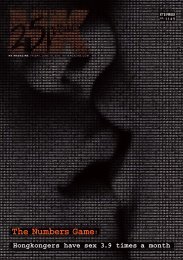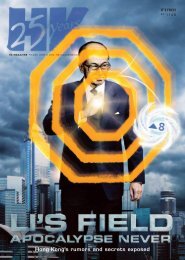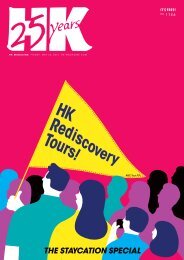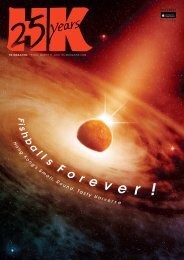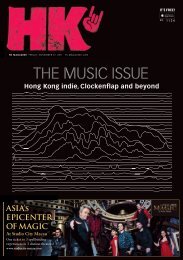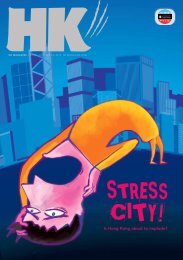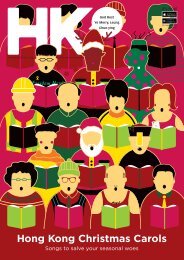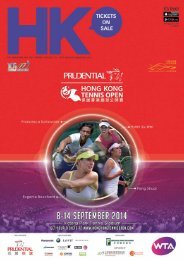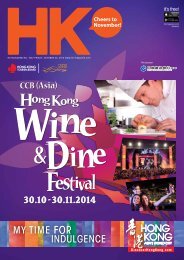You also want an ePaper? Increase the reach of your titles
YUMPU automatically turns print PDFs into web optimized ePapers that Google loves.
ackup<br />
First Person<br />
Painter and multimedia artist Simon Birch has been based in Hong Kong since 1997. Over the years,<br />
he’s risen to the top of the local arts scene. He tells Andrea Lo about how government bans led to his<br />
career as an artist, surviving cancer, and responds to reports that he is leaving Hong Kong for good.<br />
I am not<br />
leaving Hong<br />
Kong at all.<br />
Wherever it is in the world, I don’t give<br />
a shit. Whoever gives me a space, I’ll make<br />
art in it.<br />
I am not leaving Hong Kong at all. I’ve<br />
put a lot of time, energy and effort into<br />
this place.<br />
Photo: Bernard Ng/TEDxWanChai<br />
I grew up in the Midlands in England, about<br />
100 miles north of London.<br />
I think of myself as poly-cultural. I’m English<br />
but I’m not really English. My dad is Armenian<br />
and my mum is Polish. I’ve been living in Hong<br />
Kong most of my adult life.<br />
I left home when I was 16. It was the birth<br />
of rave music culture in England. I was swept<br />
up in that.<br />
Up until that point, football hooligan culture<br />
was one of the biggest movements in the UK.<br />
When rave culture and ecstasy came along,<br />
it all changed. All the people who were<br />
smashing your face in a couple of weeks ago<br />
were suddenly hugging you on the dance floor.<br />
I made poor decisions. I started a club night<br />
and messed it up. I ended up broke.<br />
I decided to leave England. I got a really<br />
cheap ticket that had 10 stops along the way.<br />
I eventually ended up in Australia, where I<br />
became a keen surfer and rock climber. I stayed<br />
for a few years.<br />
When my visa ran out, I came to Hong Kong.<br />
I knew a couple of people here and crashed on<br />
their sofa.<br />
I worked in a bar, then got a job as a laborer,<br />
working on the Tsing Ma Bridge.<br />
It was fun. If the weather was bad, you didn’t<br />
have to work. I went home and painted.<br />
The government banned high-access work,<br />
so I was suddenly made redundant.<br />
Then the government banned raves.<br />
I lost my day job and my weekend job.<br />
I went to a lot of galleries, and they all said no.<br />
I cut out the gallery system and did it by myself.<br />
I didn’t sell anything for a while, but eventually<br />
I started getting commissions to do portraits. A<br />
lot of those people were rich and well connected,<br />
and they really championed and promoted me.<br />
Suddenly I had a waiting list. It snowballed<br />
from there.<br />
I sold my first painting here in 2003 for about<br />
$500. Couldn’t believe it. I thought, “I’ve made<br />
it!” Now the paintings are worth anywhere from<br />
$200,000 to $1 million for the big ones.<br />
I am working on my first solo show in London,<br />
and someone else has helped me produce an<br />
enormous installation in New York. Both those<br />
projects happened because there is not much<br />
happening for me here.<br />
In New York and London, people are like,<br />
“Who the fuck are you” You think: “Wow, I need<br />
to get back to Hong Kong, where I’m noticed.”<br />
It’s really humbling, which is good.<br />
The truth is, if I do really well overseas,<br />
my profile will be a lot bigger.<br />
The bigger my profile is, the more power<br />
I have to actually have a positive influence on<br />
the community at large.<br />
Hong Kong is a difficult place to be a local<br />
artist. I think every artist feels it.<br />
Hong Kong made me as an artist.<br />
If it wasn’t for the struggle with adversity,<br />
I probably wouldn’t be making such big,<br />
bold paintings.<br />
It’s so infectious and dynamic here.<br />
You’re in this neon landscape—this living,<br />
breathing, grinding, driving, twisting,<br />
turning, amazing environment.<br />
Hong Kong needs love, nature and<br />
culture—all these socially enriching things<br />
that seem to be missing because we focus<br />
so much on material things.<br />
We have everything we need to solve<br />
all the problems in this city: all this money<br />
and power. We could clean the air, make<br />
a better quality of life here, and celebrate<br />
creative people—not just the wealthy.<br />
After being diagnosed with cancer,<br />
I was scared of dying for about 24 hours.<br />
The next morning, I thought, “I’m gonna<br />
own it.”<br />
I spent a year thoroughly depressed,<br />
thinking it was gonna come back and<br />
get me.<br />
The insecurity of cancer is going to<br />
stay with you forever. But we’ve all got<br />
issues, right<br />
I’ve flirted with money and fame. I was<br />
taking any commission that came my way.<br />
But it didn’t make me happy.<br />
The most important lesson I’ve learned<br />
is to keep my mouth shut. And realizing<br />
materials and ego were the wrong thing<br />
to pursue. What I really should have been<br />
chasing all along was love.<br />
I was DJing on weekends and running my<br />
own parties, so I had a backup income.<br />
I’m doing OK. But it’s no fun being at a party<br />
when you’re the only one dancing.<br />
HK Magazine talked to Simon Birch<br />
at last month’s TEDxWanChai.<br />
XKCD<br />
Randall Munroe<br />
46 HK MAGAZINE FRIDAY, September 5, 2014



